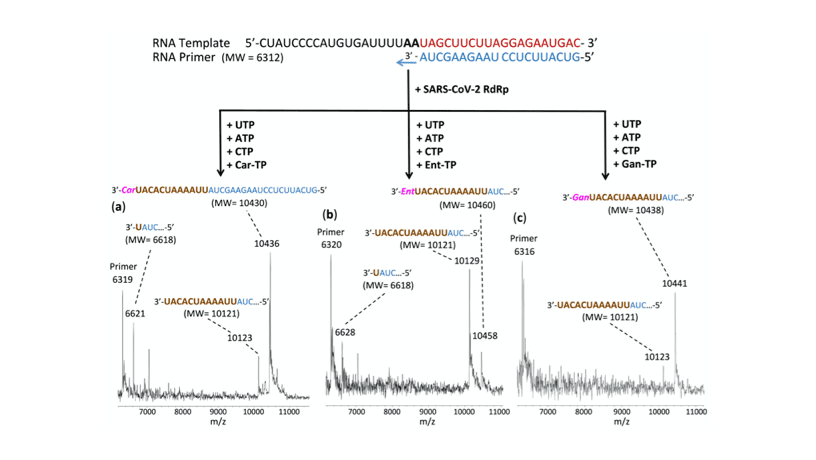A library of molecules with unique structural and chemical features inhibit the novel coronavirus polymerase, a key drug target for COVID-19
SARS-CoV-2, the coronavirus causing the global COVID-19 pandemic, uses a protein called polymerase to replicate its genome inside infected human cells. Terminating the polymerase reaction will stop the growth of the coronavirus, leading to its eradication by the human host’s immune system.
Researchers at Columbia Engineering and the University of Wisconsin-Madison have identified a library of molecules that shut down the SARS-CoV-2 polymerase reaction, a key step that establishes the potential of these molecules as lead compounds to be further modified for the development of COVID-19 therapeutics. Five of these molecules are already FDA-approved for use in the treatment of other viral infections including HIV/AIDS, cytomegalovirus, and hepatitis B. The new study was published on June 18, 2020, in Antiviral Research.
The Columbia team initially reasoned that the active triphosphate of the hepatitis C drug sofosbuvir and its derivative could act as a potential inhibitor of the SARS-CoV-2 polymerase based on the analysis of their molecular properties and the replication requirements of both the hepatitis C virus and coronaviruses. Led by Jingyue Ju, Samuel Ruben-Peter G. Viele Professor of Engineering, professor of chemical engineering and pharmacology, and director of the Center for Genome Technology & Biomolecular Engineering at Columbia University, they then collaborated with Robert N. Kirchdoerfer, assistant professor of biochemistry and an expert in the study of coronavirus polymerases at University of Wisconsin-Madison’s Institute for Molecular Virology and the department of biochemistry.
In an earlier set of experiments testing the properties of the polymerase of the coronavirus that causes SARS, the researchers found that the triphosphate of sofosbuvir was able to terminate the virus polymerase reaction. They then demonstrated that sofosbuvir and four other nucleotide analogues (the active triphosphate forms of the HIV inhibitors Alovudine, Zidovudine, Tenofovir alafenamide, and Emtricitabine) also inhibited the SARS-CoV-2 polymerase with different levels of efficiency.
Using the molecular insight gained in these investigations, the team devised a strategy to select 11 nucleotide analogue molecules with a variety of structural and chemical features as potential inhibitors of the polymerases of SARS-CoV and SARS-CoV-2. While all 11 molecules tested displayed incorporation, six exhibited immediate termination of the polymerase reaction, two showed delayed termination, and three did not terminate the polymerase reaction.
Prodrug medications of five of these nucleotide analogues (Cidofovir, Abacavir, Valganciclovir/Ganciclovir, Stavudine, and Entecavir) that terminate the SARS-CoV-2 polymerase reaction are FDA-approved for the treatment of other viral infections and their safety profiles are well established. Once the potency of the drugs to inhibit viral replication in cell culture is demonstrated in future investigations, then the candidate molecules and their modified forms may be evaluated for the development of potential COVID-19 therapies.
“In our efforts to help tackle this global emergency, we are very hopeful that the structural and chemical features of the molecules we identified, in correlation with their inhibitory activity to the SARS-CoV-2 polymerase, can be used as a guide to design and synthesize new compounds for the development of COVID-19 therapeutics,” says Ju. “We are extremely grateful for the generous research support that enabled us to make rapid progress on this project. I am also grateful for the outstanding contributions made by each member of our collaborative research consortium.”
The study is entitled “A library of nucleotide analogues terminate RNA synthesis catalyzed by polymerases of coronaviruses that cause SARS and COVID-19.” Antiviral Research. August 2020.


